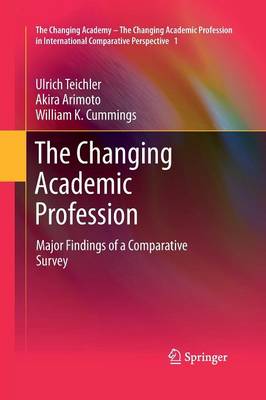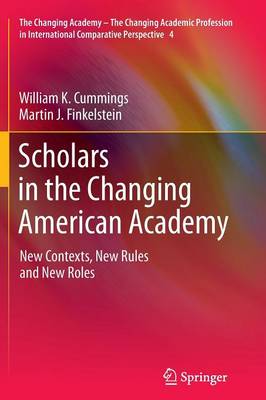The Changing Academy - The Changing Academic Profession in International Comparative Perspective
2 primary works
Book 1
The Changing Academic Profession
by Ulrich Teichler, Akira Arimoto, and William K. Cummings
This book provides an overview on the major findings of a questionnaire survey of academic profession in international perspective. More than 25,000 professors and junior staff at universities and other institutions of higher education at almost 20 countries from all over the world provide information on their working situation, their views and activities. The study "The Changing Academic Profession" is the second major study of its kind, and changes of views and activities are presented through a comparison of the findings with those of the earlier study undertaken in the early 1990s. Major themes are the academics' perception of their societal and institutional environments, the views on the major tasks of teaching, research and services, their professional preferences and actual activities, their career, their perceived influence and their overall job satisfaction. Emphasis is placed on the influence of recent changes in higher education: the internationalisation and globalisation, the increasing expectation to provide evidence of the relevance of academic work, and finally the growing power of management at higher education institutions. Overall, the academics surveyed show that worldwide discourses and trends in higher education put their mark on the academic profession, but differences by country continue to be noteworthy. Academics consider themselves to be more strongly exposed to mechanism of regulations, incentives and sanctions as well as various assessments than in the past; yet their own freedom, and responsibilities and influence shape their identity more strongly and are reflected in widespread professional satisfaction.
Book 4
Scholars in the Changing American Academy
by William K. Cummings and Martin J. Finkelstein
As the nature of education generally, and higher education in particular, changes irrevocably, it is crucial to understand the informed opinions of those closest to the institutions of learning. This book, based on a survey of academics in 19 nations and conducted by leading global scholars, is a thorough sounding of the attitudes of academics to their working environment. As the post-WWII liberal consensus crumbles, higher education is increasingly viewed as a private and personal investment in individual social mobility rather than as a public good and, ipso facto, a responsibility of public authorities. The incursion of corporate culture into academe, with its 'stakeholders', 'performance pay' and obsession with 'competitiveness' is a matter of bitter debate, with some arguing that short-termism is obviating epoch-making research which by definition requires patience and persistence in the face of the risk of failure.
This book highlights these and many other key issues facing the academic profession in the US and around the world at the beginning of the 21st century and examines the issues from the perspective of those who are at the front line of change. This group has numerous concerns, not least in the US, where government priorities are shifting with growing budget pressures to core activities such as basic education, health and welfare. Drawing too on comparable surveys conducted in 1992, the book charts the actual contours of change as reflected in the opinions of academics. Critically, the volume explicitly compares and contrasts the situation of American academics with that of academics in other advanced and developing economies. Such an assessment is critical both for Americans to chart the future of their indigenous tertiary enterprise, but also for shaping the response of the nations around the world who contemplate applying the American model to their own national systems.

